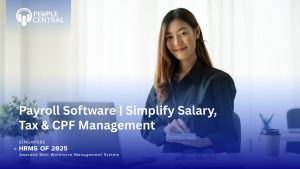The annual Singapore Budget unveils changes that impact businesses across the nation. As a Singapore enterprise leader, staying informed about these developments is crucial for effective financial planning and tax optimization. This blog delves into the key IRAS tax rates 2024-2025 for enterprises, as outlined in the 2024 Budget, to help you navigate the upcoming tax season with clarity.
Understanding IRAS Tax Rates for Enterprises
The Inland Revenue Authority of Singapore (IRAS) governs taxes in Singapore. For enterprises, the primary tax concern is the Corporate Income Tax (CIT).
Here’s a quick refresher on the current IRAS tax rate for enterprises:
- Flat Corporate Income Tax Rate: Singapore boasts a competitive flat CIT rate of 17% for all chargeable income of companies, both local and foreign.
This consistent rate simplifies tax calculations and fosters a business-friendly environment. However, the 2024 Budget introduced some important changes that go beyond just the headline IRAS tax rate 2024-2025. Let’s explore them further.
Also, check out our latest blog on how to avoid mistakes when filing IRAS 2024-2025!
The Impact of the 2024 Budget on Enterprise Taxes
While the IRAS tax rate 2024-2025 remains at 17% for most enterprises, the 2024 Budget introduced a new tax measure aimed at Multinational Enterprises (MNEs) with a global footprint:
- Minimum Effective Tax Rate (METR): Singapore will implement a Minimum Effective Tax Rate (METR) of 15% for large MNE groups with annual group revenue of 750 million euros or more in at least two of the four preceding financial years. This measure aligns Singapore with global tax reforms under Pillar Two of the OECD/G20 Base Erosion and Profit Shifting (BEPS) Project.
What does this mean for your enterprise?
- If your enterprise qualifies as an MNE under the new METR guidelines, you’ll need to assess its potential impact on your overall tax liability.
- Consulting with a qualified tax professional is highly recommended to understand your specific situation and ensure compliance with the new regulations.
While the METR primarily targets large MNEs, the 2024 Budget also introduced other tax-related initiatives that may benefit your enterprise:
- Extension of Additional Higher Education Tax Relief (AHETR): The AHETR, which provides tax deductions for qualifying expenses incurred on approved foreign higher education courses, has been extended for another five years, until Year of Assessment (YA) 2029. This can be beneficial for enterprises that invest in employee upskilling and development.
- Enhanced CPF Contribution Rates for Older Workers: The government will gradually increase the CPF contribution rates for older workers (aged 55 to 70) to ensure their retirement adequacy. This may have implications for your payroll planning.
Remember, it’s always best to consult a tax professional to understand how these changes might affect your specific enterprise and identify any potential tax optimization strategies.
Beyond IRAS Tax Rates: Additional Considerations for Enterprises
Tax planning for your enterprise involves more than just the IRAS tax rate 2024-2025. Here are some additional factors to consider:
- Tax Deductions and Allowances: Take advantage of various tax deductions and allowances offered by IRAS, such as for research and development (R&D) expenses and donations to approved charities.
- Transfer Pricing: If your enterprise is involved in transactions with related parties (e.g., subsidiaries), ensure adherence to transfer pricing guidelines to avoid potential tax adjustments from IRAS.
- Tax Filing and Compliance: Meet all tax filing deadlines and maintain accurate records to ensure smooth interactions with IRAS.
Staying informed and compliant with IRAS regulations can save your enterprise time, resources, and potential penalties in the long run.
PeopleCentral: Your Trusted Partner for Streamlined HR & Payroll (continued)
- Expert Support: Our team of HR and payroll specialists stays updated on the latest IRAS regulations and can provide guidance to ensure your enterprise remains compliant.
- Scalability and Flexibility: PeopleCentral adapts to your enterprise’s growth and changing needs, offering a scalable solution for managing your HR and payroll functions.
By leveraging PeopleCentral’s platform and expertise, you can:
- Free up valuable HR resources: Focus on core business activities while we handle the administrative burden of payroll and tax calculations.
- Minimize the risk of errors: Our automated processes ensure accurate calculations and timely submissions, reducing the chances of penalties from IRAS.
- Gain valuable insights: Utilize data reports to analyze payroll trends and identify areas for cost optimization.
PeopleCentral empowers you to streamline your HR and payroll processes, ensuring compliance and freeing you to focus on strategic business initiatives.
Conclusion: Navigate Tax Season and Beyond with Confidence
Understanding the IRAS tax rate 2024-2025 and other tax-related changes announced in the 2024 Budget is essential for Singapore enterprises. While the headline corporate tax rate remains at 17%, the METR for large MNEs and other initiatives necessitate careful evaluation.
PeopleCentral can be your one-stop shop for navigating tax season and beyond. We offer a comprehensive HR and payroll platform, expert support, and a commitment to staying current with IRAS regulations.
Ready to simplify your HR and payroll processes and navigate the ever-changing tax landscape with confidence? Visit our website at https://peoplecentral.co/ to schedule a free demo and explore how PeopleCentral can help your Singapore enterprise thrive.
Don’t let tax season and complex regulations hinder your business growth. Partner with PeopleCentral and focus on what you do best – running a successful enterprise!








 5
5


























